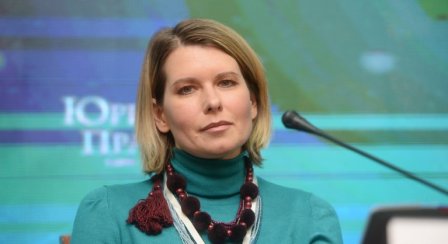Contact center of the Ukrainian Judiciary 044 207-35-46
ABOUT THE SUPREME COURT
FOR CITIZENS
ACTIVITY
PRESS-CENTER

On November 10, 2021, Judge Hanna Vronska, Secretary of the Chamber on Cases on Corporative Disputes, Corporative Rights and Securities of the Commercial Cassation Court within the Supreme Court, took part in the Forum on Ecology and Sustainable Development. The Forum was organized by the Yurydychna Praktyka newspaper.
During the session entitled "Sustainable Development: Unity of Business and State", Hanna Vronska shared her experience and best practices in the position of Deputy Minister of Ecology and Natural Resources of Ukraine for European Integration (2015-2016).
In addition, as the speaker noted, as a judge of the Supreme Court, she also tried to draw the attention of colleagues to the relevance and importance of the so-called "environmental" disputes according to modern approaches, using new legislation, including laws adopted to implement the Association Agreement between Ukraine and the EU. The judge also advises to follow the experience of European colleagues: "The judiciary can not be aloof from the processes that are taking place in our country."
Hanna Vronska stressed that, unlike most European countries, Ukraine had a constitutional right to a safe environment (Article 50 of the Constitution of Ukraine), as well as the obligation of the state to ensure environmental safety and maintain ecological balance on the territory of Ukraine (Article 16 of the Constitution of Ukraine). Only recently, in October 2021, the Human Rights Council of the UN General Assembly adopted a relevant resolution, emphasizing the importance of introducing the right to a safe environment in the legislation at the state level.
Continuing the theme of the speech "State and Ecology: the Role of the Executive and Judicial Branches of Government", Hanna Vronska reminded the forum participants that on September 30, 2019 the Decree of the President of Ukraine "On Sustainable Development Goals of Ukraine until 2030" was signed. This Decree aims to introduce the goals of sustainable development and ensure the balance of economic, social and environmental dimensions of Ukraine's sustainable development.
In her report, the judge of the Commercial Cassation Court within the Supreme Court singled out and analyzed the main goals of sustainable development dedicated to the environment, in particular: ensuring the conservation and rational use of water resources; taking urgent measures to combat climate change and its consequences; conservation and sustainable use of oceans, seas and marine resources for sustainable development; protection and restoration of terrestrial ecosystems and promotion of their rational use; building a peaceful and open society for sustainable development, ensuring access to justice for all and creating effective, accountable and participatory institutions at all levels.
Regarding the role of the judiciary in implementing the goals of sustainable development or in matters of environmental protection, it is very important to understand that there are different categories of cases that arise, in particular, in the following relations: air protection; conservation, use of water for the needs of the population and sectors of the economy, as well as protection of the rights of enterprises, institutions, organizations and citizens to use water; mining relations (subsoil use).
According to the judge of the Commercial Cassation Court within the Supreme Court, in the context of the right to a safe environment, Ukrainian courts are beginning to consider claims filed by public organizations in defence of an indeterminate circle of persons. Such claims are based on the provisions of the Aarhus Convention. As an example, the speaker cited the case law of the Supreme Court. According to her, these decisions are fundamental for the further formation of sustainable judicial case law.
"The trend is changing. The conservative judiciary is reverting to the environment and beginning to make decisions that contribute to more effective environmental protection. This is a very interesting direction, and the future is behind it,” summed up Hanna Vronska.